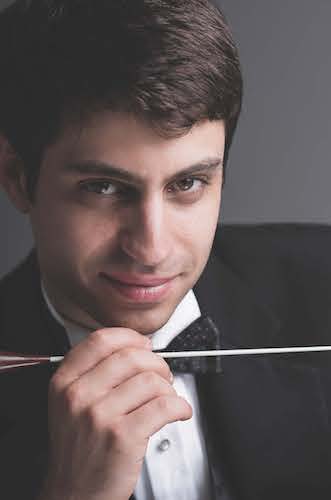Third conductor is the charm with Hersh rescuing NSO’s French program

Nicholas Hersh conducted the National Symphony Orchestra Friday night.
All the drama was not on the stage in the National Symphony Orchestra’s concerts this week.
French conductor Yan Pascal Tortelier fell suddenly ill on Thursday, precipitating the last-minute cancellation of that evening’s NSO concert. A frenzied search for a replacement maestro settled on Nicholas Hersh. The young associate conductor of the Baltimore Symphony Orchestra filled in at Friday’s concert in the Kennedy Center Concert Hall, with just one program change.
Hersh was the third conductor slated for these concerts. Tortelier, who will turn 72 next week, had agreed to take over this program of French impressionist music from Mirga Gražinytė-Tyla. The Lithuanian conductor gave birth to her first child last August, and she has canceled almost all of her guest conducting appearances for two years. Almost — she led a program with the Los Angeles Philharmonic just last week.
The nature of the health crisis that struck Tortelier has not been disclosed, but it was serious enough that the French maestro had to withdraw from all three NSO performances. In a twist of fate, the last time that Tortelier canceled a concert was an appearance with the Baltimore Symphony Orchestra in 2015. His replacement for those concerts was none other than Nicholas Hersh—in the young Illinois-born conductor’s subscription concert debut.
Hersh saved the day Friday night, no doubt, his late subbing recognized by an enthusiastic audience and the musicians themselves, who greeted him with grateful acclaim. He led the two pieces by Ravel on the first half with well-coordinated efficiency, encouraging the musicians to revel in the French composer’s multicolored orchestration.
The Valses nobles et sentimentales seemed less familiar to the orchestra perhaps, last played by the NSO back in 1990. Still, the flute solos went with languid ease in the hands of assistant principal flutist Leah Arsenault Barrick, and the team of five percussionists added countless highlights to the quiet ending of the piece.
Mezzo-soprano Sasha Cooke sashayed her way through Ravel’s song cycle Shéhérazade with silky legato, delicate tone, and sensuous high notes. Ravel mirrored the exotic colors of Tristan Klingsor’s poetry with evanescent sounds, which accompanied Cooke’s spellbinding story-telling and immaculate French pronunciation.
Cooke intertwined her voice beautifully with another gorgeous flute solo from Arsenault Barrick in the second song. Hersh let the lush final song unfold softly and breezily, in which the orchestra seemed to exhale perfumed sighs in response to Cooke’s voice.
The major disappointment of the concert was the loss of what would have been the NSO’s first performances of two tone poems by Lili Boulanger. Unable to work every miracle, Hersh replaced them with Debussy’s shorter and more familiar Prélude à l’après-midi d’un faune. The challenge of yet another prominent flute solo appeared to pose no problem for Arsenault Barrick, who set the sultry tone of this lush tableau inspired by the poetry of Stéphane Mallarmé. Hersh rushed through the piece a bit, achieving some nice effects with the pert violin solos of concertmaster Nurit Bar-Josef but also missing some expansive, languid effects.
Hersh yielded stronger results in the more active La Mer, capably navigating a way over the tidal swells at the end of the first movement. His clear beat anchored the second movement, with its complex wavy patterns of duple crossing triple. The strings cohered beautifully throughout, especially the lower sections in that striking deep section in the first movement. The menacing wind, whipped up by the bass instruments in the third movement, was answered serenely by a poignant oboe solo from assistant principal Jamie Roberts in this fine performance.
The program will be repeated 8 p.m. Saturday. kennedy-center.org; 202-467-4600


